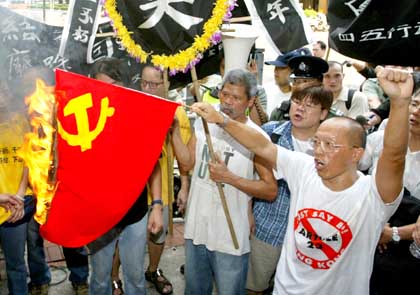The marchers make democracy work
Hong Kong plunged yesterday into its "deepest political crisis" since the 1997 handover to China when the territory's leader, Tung Chee-hwa, was forced into a humiliating u-turn on security legislation demanded by Beijing, the British newspapers reported on Tuesday.
Source : BASE21

by Christian / Base21 Media Activists
dvs-b@t-online.de
Hong Kong plunged yesterday into its "deepest political crisis" since the 1997 handover to China when the territory's leader, Tung Chee-hwa, was forced into a humiliating u-turn on security legislation demanded by Beijing, the British newspapers reported on Tuesday.
The chief executive, who was hand-picked by "communist" party bosses to steer Hong Kong after the transfer from British rule, undermined his authority and embarrassed his superiors on the mainland by announcing that he would delay an anti-subversion law in the face of an overwhelming display of people power and the loss of a key ally.
The climbdown marks a victory for the 500,000 residents who took to the streets last week in the biggest demonstration in the territory since the 1989 Tiananmen Square protests - and challenges the communist party to show whether it has changed since the murderous crackdown that followed.
Having misread the mood in Hong Kong, Beijing is now obliged to consider whether to prop up or replace Tung, a choice that represents the toughest challenge yet to the "one-nation, two-systems" arrangement under which the territory is granted more freedoms and democracy than the mainland.
Christine Loh, a former independent member of the legislative council, said Hong Kong had entered uncharted constitutional waters. "The government has effectively fallen, but we don't have a political system with a self correcting mechanism," she said.
"This a big test for Beijing. If it wants to show the world that one country, two systems can work, then it must use a light hand. There is a lot of prestige involved. The stakes are very high."
Criticized by his opponents for kowtowing to Beijing, Tung, a business tycoon, has grown increasingly unpopular since the 1997 handover as a result of the Asian financial crisis and record unemployment.
Public fury reached a peak last week, when the chief executive tried to push through an unpopular anti-subversion law that is seen as a threat to the civil liberties and press freedoms that were left largely intact after the 1997 handover.
Despite last Tuesday's massive demonstration of 7% of Hong Kong's population and criticism from Britain, the United States and the European Union, Tung continued to push the legislation. He is obliged to enact it under the 1997 Basic Law, which serves as a form of constitution for the territory. He offered a number of concessions over the weekend, but these were not enough to save his reputation.
The most contentious clause had required the government to outlaw any group found to be linked to a proscribed mainland organisation, such as democratic civic groups. This was deleted in the concession announced on Saturday. In another concession, Tung added a public interest clause for journalists prosecuted for writing about confidential government documents.
However, after the loss of a pro-China ally, James Tien, made it inevitable that he would lose the scheduled vote in the legislative council on Wednesday, the chief executive had no choice but to accept a delay.
"Tung has lost control in the legislature, has lost the iron votes he thought he had. There is an enormous crisis in his administration," Allen Lee, a political commentator and a leading Hong Kong deputy to China's parliament, told reporters. "Usually, at such times, the government should step down, or collapse. As to whether Tung will collapse or step down, I believe the decision is not purely Tung's, but the Chinese government will have to deal with this crisis."
There is no precedent for a leader to step down mid-term. The Basic Law states vaguely that a chief executive should resign for "ill health or other reasons," but it would be embarrassing for leaders in Beijing to replace Tung, whom they have supported publicly. As recently as last week, the new prime minister, Wen Jiabao, stood side by side with the chief executive in trying to reassure the territory that it had nothing to fear from the anti-subversion laws.
The crisis comes at a sensitive time for China's leadership. After taking office earlier this year, the new president, Hu Jintao, is trying to stamp his authority on the secretive 82-year-old communist party, which runs one of the world's most aggressive capitalist economies. But Hu's freedom of movement is restrained by his predecessor, Jiang Zemin, who retains control of the armed forces.
Hong Kong puts the party in an unexpected bind. For the past six years, its assumption has been that the territory's seven million residents are more interested in making money than pursuing democracy. But the sudden surge of activism could set a precedent that threatens its own authority on the mainland.
So until now we've a great victory for democracy and this could be a model for our movement here in South Korea.
2003 / -0 / 7-
|
























